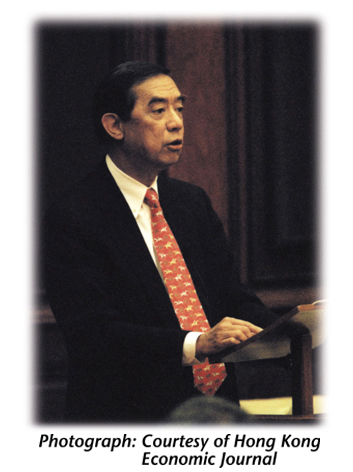 |
|
The Honourable Ronald Arculli, J.P., fully supports the Government's initiatives to work towards having a more effective and efficient public service. As Chairman of the Legislative Council's Finance Committee, Mr. Arculli is best placed to advise us on why the public sector must press ahead vigorously with Enhanced Productivity Programme |
|
|
One year lapsed since the EPP was introduced but bureaux and departments have pledged only $818 million in productivity gain. Hence, in the coming financial year, the Finance Bureau aims to achieve a further 1% productivity gains in the Government's baseline operating expenditure and in the subsequent year, a further 2%. To meet the target, heads of departments should focus on making use of technology and utilizing greater human resource management flexibility. Paper- and people-intensive nature of government processes may suggest that such streamlining is equivalent to reduction in service. Bill Gates the Chairman of Microsoft suggests in his book "Business @ The Speed of Thought" that any government should re-invent itself with electronic communication networks and replace paper flow with digital publishing. Nowadays, most officials in the government have a PC on their desks. The saving could be enormous if the printed documents are replaced by the electronic means e.g. e-mail. I see no reason why three years is not enough for preparing such transition. Evidently, the use of information technology is not restricted only in circulating memos. From the experience of digitizing the deed registration system at the Land Registry, we found that productivity surged after the installation of the new system. Therefore we must make sure that the use of information technology is introduced ASAP and used in every bureau and department. Another issue is management of human resources which is in urgent need of a major overhaul. Although I sincerely believe that the majority of our civil servants are honest and hard working, many reports point out that there is still ample room for the Administration not just to save cost, but also to enhance productivity. Critically assessing actual manpower requirements and implementing a flexible system are keys to success in human resource planning. For instance, in an audit conducted by the Director of Audit on the planning of manpower at immigration control points, it was found that miscalculation of manpower requirement led to inefficient allocation of staff. This misallocation is not only wasting government resources but also the time of those they serve. I believe that there are many similar cases in other government departments and bureaux that have not been uncovered. Heads of departments should leave no stone unturned to find new ways to utilize the staff so as to attain or even surpass the target set by the Finance Bureau. In long run, however, we are looking for not just productivity gain but also long lasting and fundamental changes. First, policy makers should focus on priority and meeting the ends and the means. Secondly, the government should make sure that the use of technology is entrenched at every level. Most importantly, to make first and second goals possible, development of human resources flexibility is a must. Therefore, it is inevitable that one must also reform the existing civil service system.
|
|
 The
budget deficit for the 1998-1999 financial year was $23.2 billion and
this deficit is being financed by drawing on the reserves accumulated
over the last decade. Although the level of our reserves is still extremely
healthy and the windfall gain from the equity market since August 1998
has filled in part of the gap, the government cannot continue to draw
on the reserves indefinitely. The real issue is that the public sector
must give value for money and avoid waste whatever the level of our
reserves. Last year, the Secretary for the Treasury, Miss Denise Yue,
presented to the Legislative Council the Enhanced Productivity Programme
(EPP) with the objective of bringing a 5% increase in productivity in
government bureaux and departments by the year 2002 - 03 in order to
cushion years where we may have deficits. However, an important question
is whether this 5% is sufficient.
The
budget deficit for the 1998-1999 financial year was $23.2 billion and
this deficit is being financed by drawing on the reserves accumulated
over the last decade. Although the level of our reserves is still extremely
healthy and the windfall gain from the equity market since August 1998
has filled in part of the gap, the government cannot continue to draw
on the reserves indefinitely. The real issue is that the public sector
must give value for money and avoid waste whatever the level of our
reserves. Last year, the Secretary for the Treasury, Miss Denise Yue,
presented to the Legislative Council the Enhanced Productivity Programme
(EPP) with the objective of bringing a 5% increase in productivity in
government bureaux and departments by the year 2002 - 03 in order to
cushion years where we may have deficits. However, an important question
is whether this 5% is sufficient.  The
civil service has always been held in high esteem by the community not
just because of their dedication, hard work and loyalty but also because
the civil service was not considered the sector that always offered
the most attractive terms of employment. However, during the recent
Asian financial crisis, civil servants were the most envied not the
least because of job security. I implore you all to live up to the high
expectations the community has of all of you. Help Hong Kong regain
and maintain its historical competitiveness even if it means some sacrifice.
The
civil service has always been held in high esteem by the community not
just because of their dedication, hard work and loyalty but also because
the civil service was not considered the sector that always offered
the most attractive terms of employment. However, during the recent
Asian financial crisis, civil servants were the most envied not the
least because of job security. I implore you all to live up to the high
expectations the community has of all of you. Help Hong Kong regain
and maintain its historical competitiveness even if it means some sacrifice.